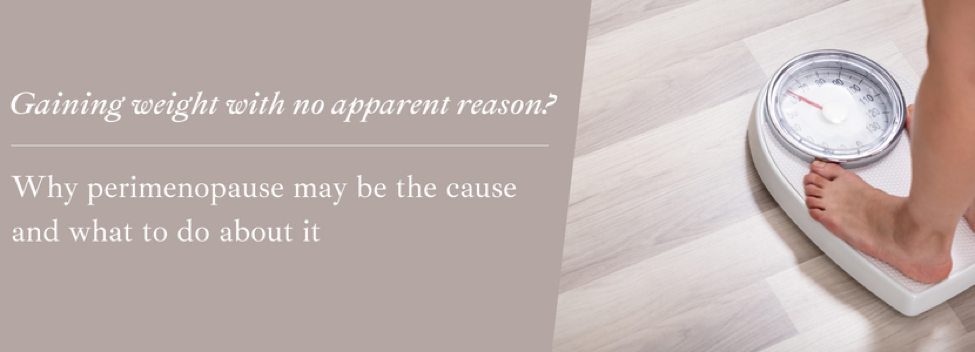
If you’re a woman who hasn’t gained much weight over the last 20 years but now the scale is climbing without an apparent reason, you may be wondering, “why now?”
For those in their late 30s to mid 40s, the answer may lie within the natural aging process of perimenopause.
A precursor to menopause, perimenopause is the beginning of hormone decline in women.
Estrogen and progesterone are the primary hormones that start to fluctuate, however testosterone can gradually recede as well.
Sleepless nights, moodiness, irregular cycles, and low libido are common during this time as well as…you guessed it, weight gain.
So what makes a woman unexpectedly gain weight during perimenopause when nothing has significantly changed in diet, exercise, and lifestyle habits?
It mostly comes down to cortisol and insulin.
As estrogen and progesterone decline, the body naturally wants to store fat because of unchecked cortisol and insulin.
Cortisol is a naturally-made hormone released by the adrenal glands that helps manage our fight-or-flight response, protecting against inflammation and damage from acute stress.
Progesterone and estrogen buffer and balance the body’s response to cortisol. When these two hormones decline, the body becomes more sensitive to cortisol which can lead to the unwanted side effect of weight gain (cortisol can convert to fat).
Insulin is a hormone produced by the pancreas that moves sugar out of the blood and into cells (muscles and tissues) for energy.
Lower estrogen and progesterone make it more difficult for the body utilize insulin properly in which sugar can stay in the bloodstream longer resulting in conversion to fat.
Now, could these be evolutionary survival mechanisms? Possibly.
Even if so, it still doesn’t sit well with many women and doctors considering potential harmful effects of unhealthy weight gain such as cardiovascular disease, diabetes, and possibly cancer.
This is why mindful and sustainable weight management during perimenopause is important for overall well-being as a woman ages.
Things to know
Stress increases cortisol levels.
Stress is stress is stress and it all produces cortisol.
The body can’t tell the difference between good stress (such as an intense workout) and bad stress (like worry and anxiety) so mindful lifestyle choices can be key in keeping cortisol levels in check.
Tip: HIIT workouts (no more than 25 minutes at a time), strength training, yoga, and walking can all provide beneficial exercise without raising cortisol levels for the remainder of the day.
Carbs and sugars can turn to fat more easily.
Wine, breads, desserts, and processed foods can be difficult for the body to metabolize as a woman ages due to low estrogen and progesterone which can lead to insulin resistance and weight gain.
Tip: muscle mass can help the body process carbs in a more efficient manner so opt for strength training movement when possible.
Focusing on health markers in addition to a scale can provide more holistic feedback.
A scale can be the go-to when monitoring weight, but other markers can be just as helpful and may provide a more well-rounded look at health.
Tip: observe sleep and mood, monitor mental health, and take note of overall strength and well-being.
Adaptogens can help manage cortisol.
Adaptogen herbs such as ashwagandha, rhodiola, eleutherococcus senticosus, holy basil, and astragalus root work to manage stress by bringing the body back to a homeostasis state.
Tip: supplements such as Adrenal Response® by Innate Response and Cortisol Manager® by Integrative Therapeutics as well as many adaptogen teas can be taken on a daily basis to manage stress and keep cortisol levels in-check.
Transitioning to perimenopause can be a challenging time for many women with weight gain being an unwanted side-effect of this change.
If you are experiencing symptoms of perimenopause and would like to find more stability in such areas as mood, sleep, weight, libido, and digestion, please call us at (303) 688-6698 or click here to schedule a free 15 minute phone consultation with Dr. Graves to discuss your issues and to learn how naturopathic medicine may be able to help.
The CNMA office provides naturopathic care, acupuncture, testing, massage, and holistic counseling to those in Castle Rock, Castle Pines, Highlands Ranch, Lone Tree, Centennial, Parker, Larkspur, Monument, Colorado Springs, and the greater Denver metro area. For those outside of these areas, virtual appointments are available.

Leave a Reply